From hard-drinking former super-people to “consulting wizard” detectives, the best supernatural gumshoes—investigators of the private but also the occult—are the ones who should really know better. They’ve stumbled onto apocalyptic conspiracies, gone toe-to-toe with demons and supervillains, and have the curses and scars to prove it. And yet, they just keep getting dragged into the kinds of cases that regular private investigators don’t even know exist.
What can we say? It’s an occupational hazard. Our favorite supernatural detectives are the ones who take their bizarre cases begrudgingly. Like the changeling who gets cursed into investigating a murder; the private eye who must defend a toon accused of offing other toons; and the FBI trainee who becomes an unwitting “Witness” to all manner of magical ridiculousness.
Harry Dresden (The Dresden Files)
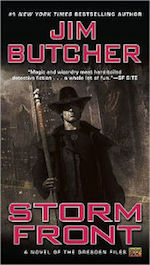 Harry Blackstone Copperfield Dresden may have been named after three stage magicians, but his real sleight of hand is in navigating real-world Chicago and the magical spheres that exist just beyond humans’ reach… to his eternal chagrin, as he gets yanked into every supernatural drama, from werewolves let loose to the vampiric Red Court (who kidnap his girlfriend)—and we haven’t even gotten to the clashing courts of the Summer and Winter Fae, who love using Harry as their reluctant pawn. A wizard PI who wields a revolver and rune-carved staff in each hand, Harry takes on any job, no matter how apocalyptic. —Natalie Zutter
Harry Blackstone Copperfield Dresden may have been named after three stage magicians, but his real sleight of hand is in navigating real-world Chicago and the magical spheres that exist just beyond humans’ reach… to his eternal chagrin, as he gets yanked into every supernatural drama, from werewolves let loose to the vampiric Red Court (who kidnap his girlfriend)—and we haven’t even gotten to the clashing courts of the Summer and Winter Fae, who love using Harry as their reluctant pawn. A wizard PI who wields a revolver and rune-carved staff in each hand, Harry takes on any job, no matter how apocalyptic. —Natalie Zutter
John Persons (Hammers on Bone)
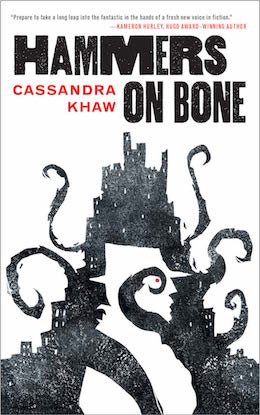 John Persons, the private eye at the dark heart of Cassandra Khaw’s fantasy noir, is the perennial gumshoe: He’s got the wardrobe, the slang, the fast-talking way of getting to the heart of a case. But the creature inhabiting Persons’ human form is thousands of years old, and knows better than to get wrapped up in the kinds of cases that aren’t worth the price. That is, until an eleven-year-old drops a piggy bank on his desk and asks him to kill his stepfather—”because he’s a monster.” And “because you’re a monster too.” Just like that, Persons is dragged into trouble. —Natalie Zutter
John Persons, the private eye at the dark heart of Cassandra Khaw’s fantasy noir, is the perennial gumshoe: He’s got the wardrobe, the slang, the fast-talking way of getting to the heart of a case. But the creature inhabiting Persons’ human form is thousands of years old, and knows better than to get wrapped up in the kinds of cases that aren’t worth the price. That is, until an eleven-year-old drops a piggy bank on his desk and asks him to kill his stepfather—”because he’s a monster.” And “because you’re a monster too.” Just like that, Persons is dragged into trouble. —Natalie Zutter
Jessica Jones (Alias, Jessica Jones)
 Okay, Jessica only works with the supernatural insofar as superhero universes often have elements of magic and the supernatural bound up in them. And she’s only a detective for a little while in the comics (though her current TV show is focusing on that aspect thus far). But Jessica as a character has all the hallmarks of a grumbling private eye; she’s no-nonsense, she’s blunt, she’s sardonic. She’s a romantic deep down under that scruffy exterior. Her television incarnation’s love of Wild Turkey cannot be understated. Whether she’s working as a detective, a reporter, or as a super-person, Jessica may not always be the hero she wants to be, but she’s definitely the hero we need. —Emmet Asher-Perrin
Okay, Jessica only works with the supernatural insofar as superhero universes often have elements of magic and the supernatural bound up in them. And she’s only a detective for a little while in the comics (though her current TV show is focusing on that aspect thus far). But Jessica as a character has all the hallmarks of a grumbling private eye; she’s no-nonsense, she’s blunt, she’s sardonic. She’s a romantic deep down under that scruffy exterior. Her television incarnation’s love of Wild Turkey cannot be understated. Whether she’s working as a detective, a reporter, or as a super-person, Jessica may not always be the hero she wants to be, but she’s definitely the hero we need. —Emmet Asher-Perrin
Raymond Electromatic (L.A. Trilogy)
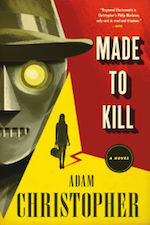 Here’s the thing: Ray—the last remaining robot from a government experiment—only pretends to be a PI, down to the wardrobe and hat. While he and Ada, his girl Friday in computer form, were designed to be an eclectic private detective agency, Ada’s prime directive to turn a profit prompted her to reform both of them into a much more lucrative business: killers for hire. However, their latest gig combines Ray’s unique talents, as silver-screen ingenue Eva McLuckie contracts him to find her missing costar, and then dispose of him. Not to mention that what should be a straightforward kill instead uncovers a massive, continent-spanning conspiracy including mind transplantation and movie screens. And while Ray lacks the human empathy that would stop him from murdering people in cold blood (er, oil?), he makes for a sympathetic detective when he must solve the mystery of what happens after his memory tapes get wiped every 24 hours. —Natalie Zutter
Here’s the thing: Ray—the last remaining robot from a government experiment—only pretends to be a PI, down to the wardrobe and hat. While he and Ada, his girl Friday in computer form, were designed to be an eclectic private detective agency, Ada’s prime directive to turn a profit prompted her to reform both of them into a much more lucrative business: killers for hire. However, their latest gig combines Ray’s unique talents, as silver-screen ingenue Eva McLuckie contracts him to find her missing costar, and then dispose of him. Not to mention that what should be a straightforward kill instead uncovers a massive, continent-spanning conspiracy including mind transplantation and movie screens. And while Ray lacks the human empathy that would stop him from murdering people in cold blood (er, oil?), he makes for a sympathetic detective when he must solve the mystery of what happens after his memory tapes get wiped every 24 hours. —Natalie Zutter
Eddie Valiant (Who Censored Roger Rabbit?)
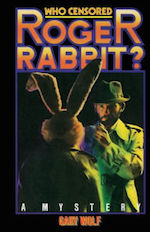
Eddie Valiant has to deal with living cartoon characters, and even if that’s relatively normal in his world, it fits pretty snuggly in the realms of supernatural from our world perspective. Based on classic noir tropes, Valiant is a chimney-smoking P.I. who ends up having to figure out who “censored”—or killed—cartoon mid-lister Roger Rabbit. (Or in the case of the film based off the novel, who framed the poor sop for more than one murder.) His investigations lead him toward the 36-year-old infant Baby Herman, and Roger’s femme fatale wife, Jessica, and it only gets more interesting from there. Valiant keeps swearing off toon cases, only to get pulled back into their orbit no matter his protestations. You’d think the guy could take the hint after a while—he’s clearly the only one for the job. —Emmet Asher-Perrin
October Daye (October Daye series)
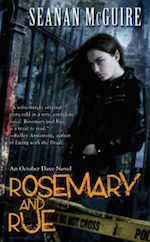 You can’t blame changeling Toby Daye for wanting absolutely nothing to do with the faerie side of her heritage: After embracing her supernatural roots, becoming a loyal knight to the duke and the go-to PI for magical matters, Toby gets transformed into a koi fish, cursed to live 14 years in a pond while the rest of the world keeps turning. Upon returning to her human form—having lost her husband and daughter—Toby would rather bag groceries than track down dangerous fae. But she didn’t count on Countess Evening Winterrose—a mentor of sorts, if not the warmest person—being brutally murdered and leaving a geas on Toby’s answering machine. While other PIs are motivated by briefcases full of money or sad-eyed dames, Toby’s reason for returning to her roots is much more straightforward but no less sinister: The geas binds her to find Evening’s killer, or die herself. —Natalie Zutter
You can’t blame changeling Toby Daye for wanting absolutely nothing to do with the faerie side of her heritage: After embracing her supernatural roots, becoming a loyal knight to the duke and the go-to PI for magical matters, Toby gets transformed into a koi fish, cursed to live 14 years in a pond while the rest of the world keeps turning. Upon returning to her human form—having lost her husband and daughter—Toby would rather bag groceries than track down dangerous fae. But she didn’t count on Countess Evening Winterrose—a mentor of sorts, if not the warmest person—being brutally murdered and leaving a geas on Toby’s answering machine. While other PIs are motivated by briefcases full of money or sad-eyed dames, Toby’s reason for returning to her roots is much more straightforward but no less sinister: The geas binds her to find Evening’s killer, or die herself. —Natalie Zutter
Lieutenant Abbie Mills + Ichabod Crane (Sleepy Hollow)
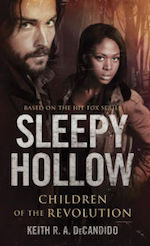 For the first two seasons of Fox’s Sleepy Hollow, we were given a great supernatural detective in the form of Abbie Mills, played by Nicole Beharie. She’s initially set up as the show’s Scully, the skeptical, by-the-books police officer who is dismissive of the supernatural nonsense around her, and just wants to split Sleepy Hollow to go off for FBI training at Quantico. Instead she finds herself tied to time-traveling Revolutionary War soldier Ichabod Crane, forced to be a “Witness”, and locked in a battle to stop the Apocalypse. She’s begrudging about the supernatural aspect of her role as a detective, but only because, as viewers gradually learn, her family has been cursed to deal with apocalyptic doom for hundreds of years, and it’s left all of them broken. Abbie’s greatness lay in her willingness to confront this past, and tackle supernatural mysteries despite the risk. If you’d like to follow Abbie on a literary adventure, we recommend Keith R.A. DeCandido’s Sleepy Hollow: Children of the Revolution, which takes Abbie and Ichabod on a hunt for a Revolutionary War-era artifact! —Leah Schnelbach
For the first two seasons of Fox’s Sleepy Hollow, we were given a great supernatural detective in the form of Abbie Mills, played by Nicole Beharie. She’s initially set up as the show’s Scully, the skeptical, by-the-books police officer who is dismissive of the supernatural nonsense around her, and just wants to split Sleepy Hollow to go off for FBI training at Quantico. Instead she finds herself tied to time-traveling Revolutionary War soldier Ichabod Crane, forced to be a “Witness”, and locked in a battle to stop the Apocalypse. She’s begrudging about the supernatural aspect of her role as a detective, but only because, as viewers gradually learn, her family has been cursed to deal with apocalyptic doom for hundreds of years, and it’s left all of them broken. Abbie’s greatness lay in her willingness to confront this past, and tackle supernatural mysteries despite the risk. If you’d like to follow Abbie on a literary adventure, we recommend Keith R.A. DeCandido’s Sleepy Hollow: Children of the Revolution, which takes Abbie and Ichabod on a hunt for a Revolutionary War-era artifact! —Leah Schnelbach
Constantine (Hellblazer)
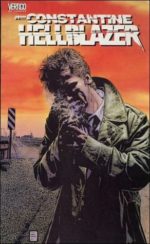 John Constantine really doesn’t want to help you with your mysterious problem, because if he does… you’ll probably die. Then again, if he doesn’t, you’ll also probably die. So he has to try? But he’d rather not. It’s a vicious cycle for the occult detective, and his less-than-savory means are balanced out with his roughly humanistic point of view. Constantine isn’t a cuddly guy, but he does believe that humanity deserves to be what it will, and that people are pretty okay overall. He just has the most rotten luck, coupled with a tendency to meddle when he shouldn’t. We see this over and over, as Constantine loses people who are close to him, and still gets back out there every time he smells a little brimstone. It’s a bad habit that he can’t seem to rid himself of. —Emmet Asher-Perrin
John Constantine really doesn’t want to help you with your mysterious problem, because if he does… you’ll probably die. Then again, if he doesn’t, you’ll also probably die. So he has to try? But he’d rather not. It’s a vicious cycle for the occult detective, and his less-than-savory means are balanced out with his roughly humanistic point of view. Constantine isn’t a cuddly guy, but he does believe that humanity deserves to be what it will, and that people are pretty okay overall. He just has the most rotten luck, coupled with a tendency to meddle when he shouldn’t. We see this over and over, as Constantine loses people who are close to him, and still gets back out there every time he smells a little brimstone. It’s a bad habit that he can’t seem to rid himself of. —Emmet Asher-Perrin
Narrator + Friend (“A Study in Emerald,” from Shadows Over Baker Street)
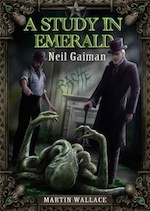
“A Study in Emerald” features one of the most famous detectives of all time going toe-to-tentacle with the eldritch gods of H.P. Lovecraft. For the first few paragraphs of the story, you’d be forgiven for thinking this was just a straight-ahead retelling of a Sherlock Holmes story, but then, when the Great Detective is summoned to a crime scene in Whitechapel, you learn that the victim has entirely too many limbs to be a human. Plus there’s all the green blood… and then you meet Queen Victoria:
She was called Victoria, because she had beaten us in battle, seven hundred years before, and she was called Gloriana, because she was glorious, and she was called the Queen, because the human mouth was not shaped to say her true name. She was huge, huger than I had imagined possible, and she squatted in the shadows staring down at us, without moving.
The Narrator and his Friend aren’t so much begrudging gumshoes so much as classic Doyle detectives. They use deduction to track a murderer, and trust in their reason ad attention to detail to guide them to the correct answers. To say much more would spoil the story, so I’ll simply urge you to go read it. “A Study in Emerald” was originally written for a collection called Shadows Over Baker Street, a collection of stories combining the worlds of Arthur Conan Doyle and H. P. Lovecraft, has since appeared in Gaiman’s collection Fragile Things, but you can read it online as a Victorian-themed broadsheet here. And once you’ve finished it, you can check out the Lovecraft Reread’s take on the story here! —Leah Schnelbach
Honorable Mention: Dirk Gently (Dirk Gently’s Holistic Detective Agency)
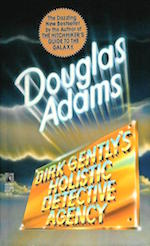 Honorable mention to Dirk Gently, who emphatically does not believe in the supernatural. He thinks the whole thing an elaborate con, but that doesn’t seem to change the fact that remarkable things keep happening around him… so that makes him begrudging, in his own naysay-ish way. Besides, if “holistic” detecting isn’t its own brand of paranormal investigation, then I don’t know what is. —Emmet Asher-Perrin
Honorable mention to Dirk Gently, who emphatically does not believe in the supernatural. He thinks the whole thing an elaborate con, but that doesn’t seem to change the fact that remarkable things keep happening around him… so that makes him begrudging, in his own naysay-ish way. Besides, if “holistic” detecting isn’t its own brand of paranormal investigation, then I don’t know what is. —Emmet Asher-Perrin
Who are your favorite begrudging supernatural gumshoes? Let us know in the comments!










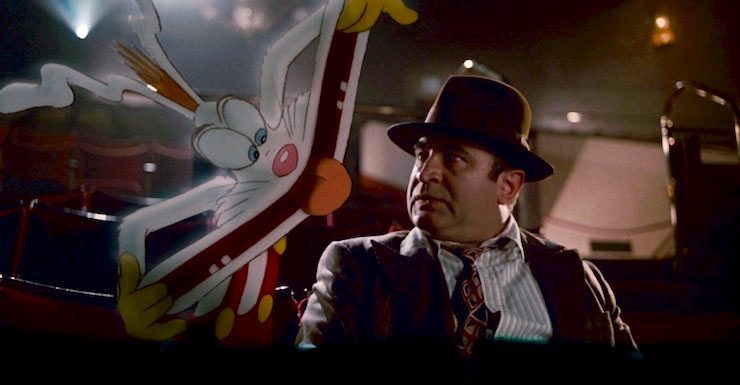
No Garrett P.I.? I mean, it’s not so much supernatural as it is fantasy, but still.
“The Nine Lives of Catseye Gomez” from Simon Hawke’s wizard series. The detective is a feral familiar. The hired killer is a demon. But who (or what?) hired the killer?
Randall Garrett’s Lord Darcy books.
Harry D’Amour from Clive Barker’s works.
Peter Grant, Ben aaronowic john taylor- night side
John Taylor from the Nightside? That stuff is all kinds of jumbled, but entertaining.
Wow. I didn’t realize that Adam Christopher’s story Brisk Money was part of a larger series. I’ll have to check the series out.
ETA: Also, have to agree with John Taylor. Nightside is my guilty reading pleasure.
@1
If Dresden is on this list, Garrett should be, too. He’s exactly Dresden, just with the supernatural elements reversed.
Or rather, Dresden is just a reversed version of him.
Garrett is my favourite PI missing from this list too.
Also, I agree that Constantine has a dangerous habit :)
Felix Castor from Mike Carey (he who did a phenomenal run on Hellblazer). And definitely a +1 for John Taylor.
What about Charlie Parker in the series by John Connolly? It’s an extremely well-written series that melds mystery with the supernatural. It doesn’t seem to get a lot of attention on Tor. Nor does trhe Shadow Police series by Paul Cornell.
Harry Angel from Falling Angel / Angel Heart (1987).
John Justin Mallory, of Stalking the Unicorn and its sequel novels and associated short stories, by Mike Resnick.
He’s an ordinary if disenfranchised Manhattan detective…until an elf seeks his help in finding a lost unicorn. This takes him on a one-way-trip to an alternate Manhattan full of supernatural creatures, criminal hijinks, and a superb abundance of hilarious randomness. Many of the other male characters are sex-obsessed noodleheads who routinely objectify women, but his kickass female work-partners (a human and a cat-girl) are wonderful.
Felix Castor – how can he not be on the list?
Tohru Takuda from James Kendley Drowning God series—as supernatural as it gets…
Where’s Garrett? If Old Tin Sorrows isn’t a supernatural detective story I don’t know what is.
Glen Cook’s Garrett P.I. should be right up there with Dresden. Ben Aaronovitch’s Peter Grant has only gotten better as the series has gone on, and Mike Carey’s Felix Castor deserves a mention too.
The “Laundry Files” by Charles Stross – as good for the humorous look at British bureaucracy as the magic and detective work.
Oh, and if you like John Taylor and the Nightside, check out Simon Green’s other supernatural detective, Eddie Drood, in the “Secret History Files;” a detective with a distinctive Ian Fleming “Bond” twist.
+1 to Peter Grant from Ben Aaronovitch’s Rivers of London books.
Also, Detective Inspector Chen, in a series by Liz Williams.
Agreeing with Peter Grant from Ben Aaronovitch’s Rivers of London books & John Connolly’s Charlie Parker series (love love love!).
Also Harper Blaine from Kat Richardson’s Greywalker series.
Dan Carter from Carter & Lovecraft by Jonathan L Howard. An honorable mention to Johannes Cabal from the eponymous series. Carter is a former cop who has been dragged into a mystery in New England where people keep dying in rather impossible ways. And what’s the deal with that woman who owns the book shop? Howard uses some of the noir tropes, brings them to the current day, and mixes in a healthy dollop of horror.
Cabal on the other hand is a necromancer of some little infamy. In the book, Johannes Cabal, the Detective, he must solve a mystery while aboard an airship. Cabal is as close to a True Neutral character as you can get in a human, and yet Howard succeeds in making him an understandable, entertaining, and occasionally even empathetic protagonist.
I’m quite fond of the Simon Canderous series by Anton Strout. Canderous and his fellow city employees of the Department of Extraordinary Affairs, in New York City, investigate crimes with a supernatural component – and try to cover them up as quickly as possible, to avoid public panic. While each member of the force has a special magical “talent,” they are not all-powerful. They also have to put up with ridiculous amounts of paperwork, and are required to take time-wasting training classes that will supposedly improve their job skills – even my fellow government employees who are not science fiction/fantasy fans laughed at those bits when I shared them.
Rachel Morgan from Kim Harrison’s Hollows series. Heck, Anita Blake.
Marty Burns, a former child actor turned private investigator, in Jay Russell’s awesome LA series
I’m really enjoying the Charley Davidson series by Darynda Jones. Charley is a PI and the grim reaper. The PI job is a lot easier when murder victims can tell you who killed them. Charley is tough in more ways than one, but warmhearted and funny. She’s also very bright, sparkly even, according to the dead souls that use her as a portal to heaven.
Barbara Hambly’s James Asher series. Those Who Hunt The Night is still my favorite, but there are many sequels, often set in exotic locales at the turn of the century.
Memorably, at the beginning of the story it looks like his young wife’s role in the story is simply to be a hostage to keep Asher working for the vampires, but Asher knows the vampires have underestimated her and she is a full partner in the investigation that follows.
Granted, the protagonist is a retired English spy rather than a classic hard-drinking PI, but he’s gotten out of the game, he’s got the scars, and he keeps getting dragged back in..
Hessius Mann from “Dead Mann Walking” and “Dead Mann Running,” a series once described as “fast-paced zombie noir with a melancholy bite.” Wish there were more of these.
I’m with RoseS, definitely Randall Garrett’s Lord Darcy. What’s not to love about an alternate-universe Sherlock Holmes with a ‘forensic sorceror’ Watson, and a series of stories chock-full of puns and allusions to other authors and their fictional works?
Also, the stories can be very funny, with this passage being a particular favorite of mine:
“Superstition, my lord, is the cause of much of the mental confusion among the lower classes. They see what is done every day by sorcerers using scientific processes and are led to believe in every sort of foolishness because they confuse superstition with science. That’s why we have hedge magicians, black wizards, witches’ and warlocks’ covens, and all the rest of that criminal fraternity. A person becomes ill, and instead of going to a proper Healer, he goes to a witch, who may cover a wound with moldy bread and make meaningless incantations or give a patient with heart trouble a tea brewed of foxglove or some such herb which has no symbolic relationship to his trouble at all. Oh, I tell you, my lord, this sort of thing must be stamped out!”
While it’s S/F only in the devices used by the evil-doers, Gahan Wilson’s “Everybody’s Favorite Duck” brought The Great Detective back out of retirement.
great picks. Might I suggest Lord Baltimore and Karl Kolchak?
Dirk Gently is my favourite of them all. Maybe because he does not believe in the supernatural and is so cross about the fact that supernatural things just keep happening around him.
I feel the need to mention one really not supernatural detective at all: Elmo Crumley from Bradbury´s Death is the lonely business. Because Bradbury, in his not-at-all-SF/F detective story, created this lovely grumpy detective, and it is Bradbury, so the book feels like a ghost story, it really kind of is a ghost story, even if the ghosts are more or less metaphorical. There´s something about Crumley´s grumpiness that just makes me want to hug him.
Harper Blaine from Kat Richardson’s Greywalker series.
Thursday Next! :)
I must agree with two previously mentioned characters, Kolchak and Lord Darcy. (I remember them both from when they were new.) A more recent series that appears to be ending at f novels and some short stories is the Thieftaker series by D B Jackson. The stories are set in Boston, just before the Revolutionary War, like in 1773. The protagonist, Ethan Kaille, has the ability to cast spells that help him solve mysteries, all the while trying to stay out of trouble with a criminal undertaking led by a beautiful woman, whose gang steals and then she “finds” the stolen goods, returning them for a healthy fee. Great stories, and you learn a bit about early American history, embellished as it is. Jackson’s website. http://www.dbjackson-author.com/
I have a soft spot for Sir Maurice Newbury and his assistant, Miss Veronica Hobbes – George Mann’s steampunk adventures are well worth investigating.
And there was a short-lived but personally much-mourned comic series called Ruse, featuring Holmes-like detective Simon Archard in a Victorian-themed alternate universe with a fantastickal tinge.
This is relevant to my interests!
Also, how about Alex Bledsoe’s Eddie LaCrosse books. Hard boiled detective in a traditional fantasy setting. I just discovered them and have been enjoying the heck out of them.
Second the recommendation for John Connolly’s Charlie Parker.
This is a great list. I’d love to see Mason Gray on it someday.